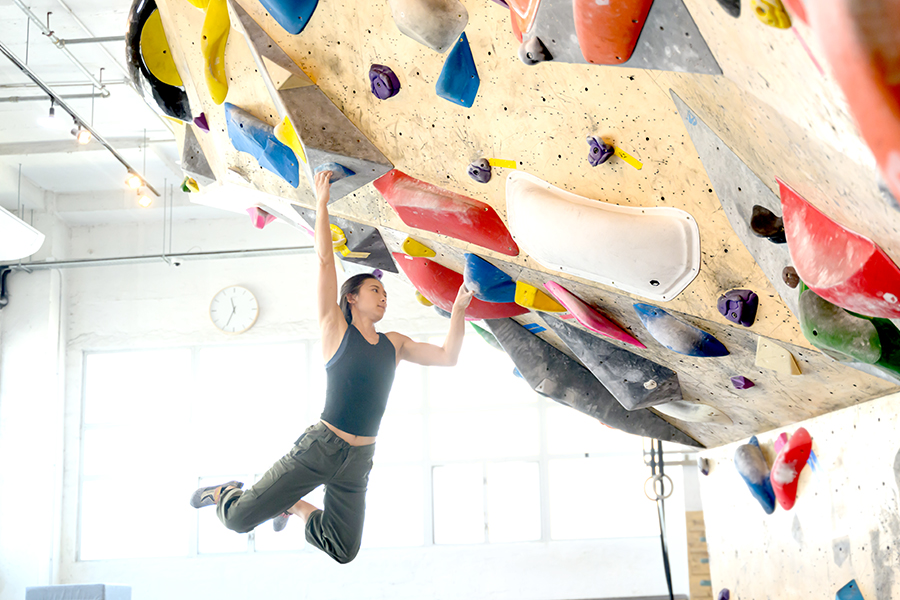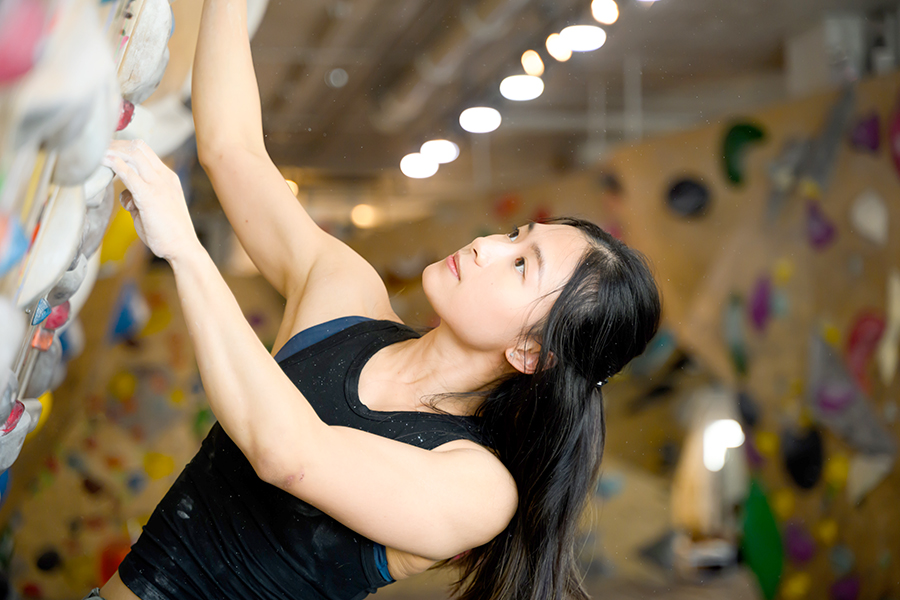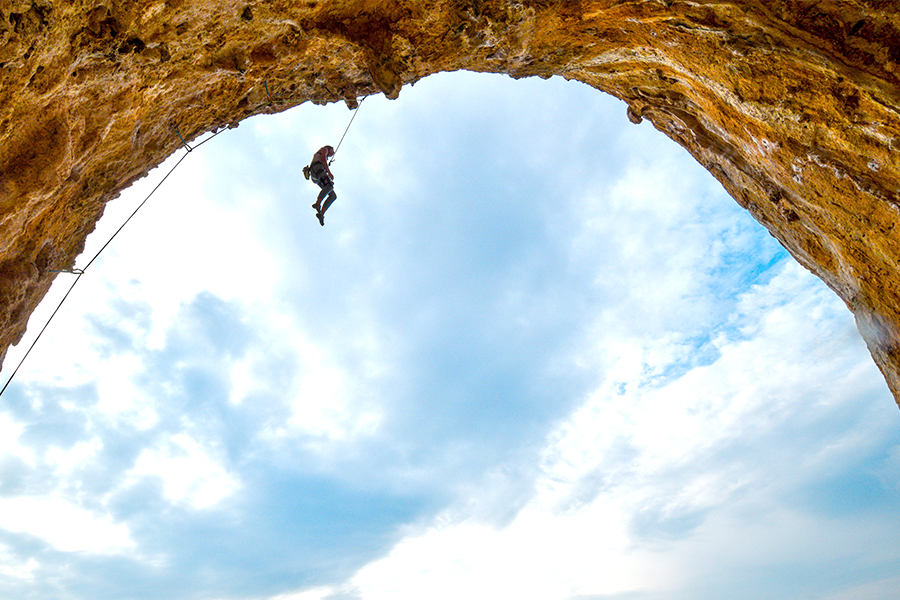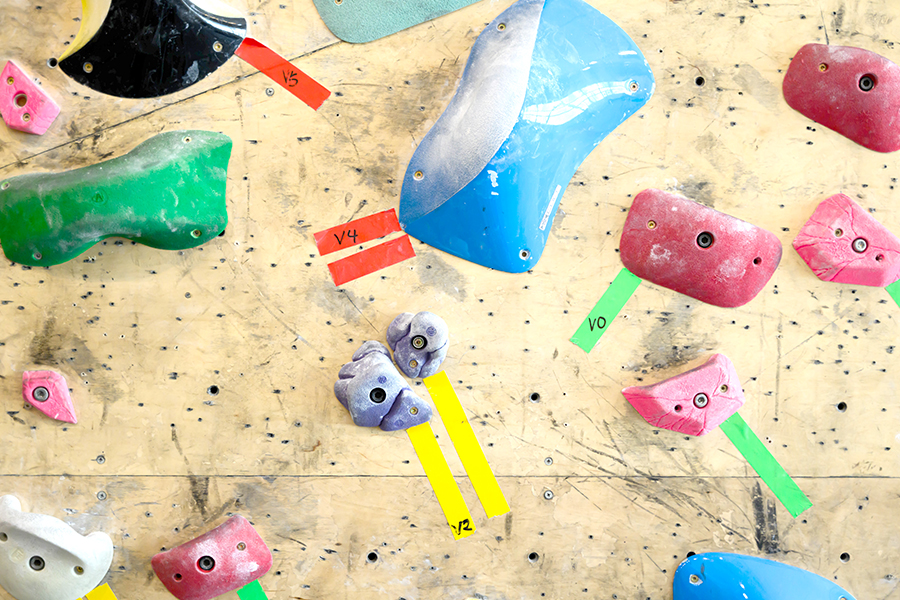Bouldering: The art of falling
 Dr Clara Tong, Resident of the Department of Surgery at Caritas Medical Centre, is passionate about bouldering once she was introduced to at university before she went on to join the Hong Kong Rock Climbing Team four years ago. At the bouldering site, she stares at the colourful climbing holds on the wall, thinks for a while, and then climbs upwards flexibly. Clara’s seemingly effortless ascents are the result of countless falls.
Dr Clara Tong, Resident of the Department of Surgery at Caritas Medical Centre, is passionate about bouldering once she was introduced to at university before she went on to join the Hong Kong Rock Climbing Team four years ago. At the bouldering site, she stares at the colourful climbing holds on the wall, thinks for a while, and then climbs upwards flexibly. Clara’s seemingly effortless ascents are the result of countless falls.
“Most people who are new to bouldering know how to climb, but in fact it’s even more important to learn how to fall,” she explains as she demonstrates her skills. Bouldering is a form of free climbing on outdoor large natural rocks or indoor artificial rock walls. Unlike lead climbing, participants use no safety ropes and climb walls of up to four metres high using bouldering shoes and non-slip powder with soft mats below to protect them when they fall. “Before you start, you need to analyse the route, gauge your skills, and think about how you will land if you fall from a height. Bouldering is not only about arm strength, but also about balance and body coordination, and the fun part is that you can do the same route in different ways.”
 Clara practises her climbing skills at least four days a week and jokes that as a busy resident taking part in basic surgical training, her life is all about work and bouldering. When she gets home at 1pm or 2pm after an overnight shift, she sleeps for a couple of hours before setting off for bouldering at 6pm or 7pm. “I buy bread to feed myself on the way, and I use my meal break and leisure time to practise bouldering,” she says. “It is definitely tough physically but, because it is something I love to do, I think it is worth it and I will persevere no matter how hard it is.”
Clara practises her climbing skills at least four days a week and jokes that as a busy resident taking part in basic surgical training, her life is all about work and bouldering. When she gets home at 1pm or 2pm after an overnight shift, she sleeps for a couple of hours before setting off for bouldering at 6pm or 7pm. “I buy bread to feed myself on the way, and I use my meal break and leisure time to practise bouldering,” she says. “It is definitely tough physically but, because it is something I love to do, I think it is worth it and I will persevere no matter how hard it is.”
Keep climbing and never give up
Clara’s surgical training involves making incisions and sutures for minor surgery as well as taking part in major surgery, including holding hooks to open surgical incisions. Does she worry about intensive training for bouldering might affect her frontline work? “I am familiar with the movements that strain my fingers, so I do not repeat them. I choose alternative routes to avoid injuries. Bouldering emphasises the coordination of large muscle groups which can build endurance.”Clara has won several Hong Kong and overseas competitions, including third place in the open section of the Hong Kong Bouldering Championships 2023 and fourth place representing Hong Kong in Asian Cup Manila 2022 – an achievement she describes as her most memorable so far. “My pursuit will always be endless, because there will always be routes that haven’t been successfully climbed,” she reflects. “However, I have already achieved my goal of playing for Hong Kong. Of course, I always want to do better but I believe it is enough as long as I have tried my best.” Clara’s career goal is also clear. “My firefighter father received skin graft surgery for burns suffered at work. Surgery is a way of restoring a person’s life, and because I like to be hands-on, I knew early on I wanted to work in the surgical team,” she recalls.
 Bouldering meanwhile not only relieves the stress of hospital work but has also changed her perspective on life. “When we climb, we challenge ourselves on routes that we have not succeeded on before, so we fall down onto the mat often when we try to climb to the top,” Clara says. “From this, I have learnt to stick to the goals I want to pursue, and not to give up easily even when I have failed and fallen. The most important thing is to learn from failure, to analyse mistakes, and to avoid repeating them. This attitude is true in work as well as in life.”
Bouldering meanwhile not only relieves the stress of hospital work but has also changed her perspective on life. “When we climb, we challenge ourselves on routes that we have not succeeded on before, so we fall down onto the mat often when we try to climb to the top,” Clara says. “From this, I have learnt to stick to the goals I want to pursue, and not to give up easily even when I have failed and fallen. The most important thing is to learn from failure, to analyse mistakes, and to avoid repeating them. This attitude is true in work as well as in life.”
 Interview video
Interview video